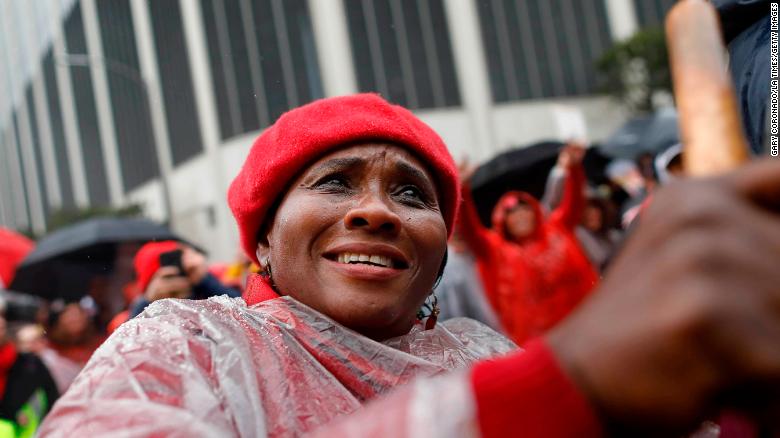(CNN)The tug of war between Los Angeles teachers and their school district may be shifting toward the teachers as picket lines keep growing, the teachers' union said.
"For two days in a row, we had over 50,000 people downtown saying we want educational justice in Los Angeles," United Teachers Los Angeles President Alex Caputo-Pearl said Wednesday.
"The public knows that it is unacceptable not to have full-time nurses. It is unacceptable to have class sizes of 47. It is unacceptable to have teachers come in and then leave because the conditions are too hard and the pay isn't enough."
More than 30,000 educators and thousands of their supporters are walking picket lines this week to demand lower class sizes, increased staffing and higher teacher salaries.
On day three of the strike Wednesday, teachers were joined by students, E Street Band guitarist Steven Van Zandt, and a former US education official who said this fight goes beyond Los Angeles.
"You are making history," former US Assistant Education Secretary Diane Ravitch told the teachers. "This is not just a Los Angeles issue, a California issue. It is a national issue."
But while the teachers want millions more in school funding, every day of the strike is costing their school district millions of dollars. That's because the state funds schools based on daily attendance. And many students are absent during the strike this week.
Parent Karen Goldman knows this -- and said the money lost by lower attendance is one reason why she's keeping her fifth-grade son out of school.
"I feel like the message I am sending by not sending him and creating a budget loss is better than if I send him, because that will hopefully bring the strike to a conclusion faster," she said.
What children are doing (or not doing) in school
Like thousands of other parents, Goldman grappled with the difficult decision on whether to send her kids to school during the strike.
So Monday, she split the difference. She sent her fifth-grader to school, but not her seventh-grade daughter, fearing her middle school would be more chaotic.
Goldman said her son's teacher is one of the few who chose not to strike.
"I thought, maybe they'll have kind of a normal day," she said.
But after one day, Goldman decided to pull her son from school, too, and find child care for him.
"He's not engaged ... and it's a depressing environment without a lot of kids around," Goldman said. "I'm in support of the teachers, but I certainly wish my kids didn't have this disruption in their education."
The school district has not responded to CNN's questions about how many teachers are not on strike and are still in classrooms.
The district said it reassigned more than 2,000 administrators and hired about 400 substitute teachers to help fill in for more than 30,000 teachers and staff on strike.
Some students have reported playing board games during school, getting crammed into auditoriums or watching movies all day long.
The superintendent defended the decision to keep schools running.
"While education in classrooms is not the same without teachers, we have a responsibility to keep schools open and provide students with a safe space, shelter from the rain, meals and modified instruction," Superintendent Austin Beutner said.
'It feels like a chess game'
Not much progress has been made between the union and the school district in three days of the strike.
The standoff comes down to two issues: how much money to spend on more school staffing and teachers' raises, and whether the school district actually has that kind of money.
Beutner said there's no way the district can afford right now to give the union everything it wants. He noted an independent fact-finder agreed that it doesn't have the money to cover the union's demands.
The district did offer $130 million toward what the union wants, but UTLA rejected that proposal.
The teachers' union has a different take on the numbers.
It said the school district should tap into $1.8 billion in reserves to fund more desperately needed staff members as well as to increase teachers' pay.
The superintendent said that the $1.8 billion is already earmarked for education spending during this three-year budget cycle. At this rate, the district said, it might not even have enough money to meet a required 1% reserve by the 2021-2022 school year.
But the union president said the school district has "always been wrong in their projections, so we just don't believe those numbers."
"The district's three-year projections have always been wrong," Caputo-Pearl said. "Three years ago, they predicted a $105 million reserve; they ended with a $1.86 billion reserve. They were off by $1.7 billion."
The superintendent blamed the union for rejecting the latest offer and not coming back to the negotiating table.
"They walked away from bargaining. We would encourage them to resume bargaining with us anytime, anywhere, 24/7," Beutner said. "We'd like to resolve this."
The standoff is frustrating for parents, especially those who don't want their children in school without their teachers. Some are making day-by-day decisions on child care, taking turns with other parents on watching each other's kids.
But Goldman said she realizes this battle could drag on for quite a while.
"It feels like a chess game or playing chicken, so to speak."







